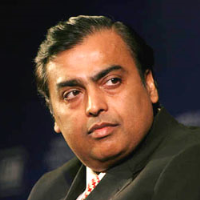Two MPs Received Stipends from Reliance Before They Became Ministers
 Reliance Industries chairman Mukesh Ambani
Reliance Industries chairman Mukesh Ambani
It’s tough being India’s richest man. Mukesh Ambani, worth an estimated $20 billion, must have several hundred thousand people on his payroll, but the names of only two raised eyebrows this week. The news that two senior politicians Ravi Shankar Prasad and Manish Tewari were earlier paid around $100,000 each annually for ‘legal consultancy’ has shocked many even in India, a country inured to the cosy relationship between business and politics.
You may ask, why is this important? Because both gentlemen, one from the BJP and the other from the Congress, were paid a monthly legal retainer before they became ministers in the NDA and UPA2 governments respectively.
According to the Financial Times, neither Reliance nor the two politicians publicly disclosed the monthly payments. Prasad invoiced a Reliance affiliate company for over $100,000 in one year before he became telecoms minister last May. Tewari sent similar bills over a number of years before he was appointed broadcasting minister in 2012 in the previous UPA government.
Accepting paid retainers from companies is not forbidden by parliamentary rules, and commercial arrangements do not always have to be disclosed. There is no suggestion that any of them broke Indian laws.
Both politicians are lawyers by profession, and it is relatively common for MPs with legal backgrounds to continue legal practice, including appearing in court for corporate clients. All parties deny wrongdoing.
Nevertheless the existence of undisclosed retainer contracts between a company run by the country’s pre-eminent businessman and senior parliamentarians raises questions about political transparency and the perception of potential conflicts of interest. For instance, Ambani’s Reliance Jio Infocomm is planning to roll out 4G services in early 2015, which fall under the purview of the telecoms ministry headed by Prasad.
“This is a very serious problem,” said Professor Jagdeep Chhokar, former dean of IIM, Ahmedabad and co-founder of the Association for Democratic Reforms, a campaign group.
“If these contracts are not disclosed, how do we decide whether any person is taking decisions in the public interest, or in the interest of a particular company?” he told FT.
The opposition Aam Aadmi Party (AAP) has charged both politicians with “alleged “conflict of interest and gross impropriety”. It called for Prasad’s resignation as telecoms minister.
Documents seen by the FT reportedly show that Prasad, a former BJP spokesman, sent an invoice for Rs. 84 lakhs ($135,506) for legal services provided between April 2013 and March 2014 to Fine Tech Corporate Private, a Reliance affiliate.
He was appointed as telecoms minister in May 2014, following the BJP’s victory in national elections.
Manish Tewari, a senior leader in the Congress party, agreed to a monthly retainer in June 2010 and received a total of Rs. 1.20 crore ($193,580) over the next two years. In June 2012, Tewari wrote to Reliance asking for his contract to be renewed. Reliance then agreed to pay him a total of Rs. 1.44 crore ($232,295) for two further years.
Both politicians say they ceased all commercial legal work upon becoming ministers, as required by India’s ministerial code.
Prasad said in a statement that any legal work undertaken as an MP “has been purely in professional capacity, only like a lawyer and client and nothing else”. Tewari told the FT that he also had acted within the rules.
According to Milan Vaishnav of the US-based Carnegie Endowment for International Peace, the existence of similar commercial arrangements with parliamentarians would be controversial in Western democracies.
In the US, members of Congress are not allowed to accept commercial payments. In the UK, such payments are allowed under certain circumstances but must be disclosed.
“The idea of senior politicians accepting undisclosed lucrative retainer contracts with big companies would cause a major scandal,” Vaishnav told the FT. “Conflict-of-interest standards in Indian politics are pathetically weak.”
In a statement Reliance pointed out that India’s rules allow hiring MPs for legal advice and stressed that any “engagement discontinues” if an MP becomes a minister.
“RIL [Reliance] has large and varied demands for legal assistance,” the company said. “Our selection of lawyers is based on our needs and their expertise and that has nothing to do with their being in politics or being an MP.”
To Learn More:
Reliance payments to Indian politicians raise transparency issues (by James Crabtree, The Financial Times)
AAP raises fresh questions on Ravi Shankar Prasad’s retainership fee from Reliance Industries (PTI)
AAP charges Prasad, Tewari with conflict of interest (Hindustan Times)
AAP demands dismissal of Telecom Minister (India Today)
In The Dock (Outlook)
- Top Stories
- Controversies
- Where is the Money Going?
- India and the World
- Appointments and Resignations
- Unusual News
- Latest News
- India College Chain’s Expansion into U.S. Draws Opposition from Massachusetts Officials over Quality of Education
- Milk Shortages in India Tied to Release of New Movies Featuring Nation’s Favorite Stars
- Confusion Swirls around Kashmir Newspaper Ban in Wake of Violent Street Protests
- Polio-Free for 5 Years, India Launches Vaccine Drive after Polio Strain Discovery
- New Aviation Policy Could Increase Service, Lower Ticket Prices






Comments